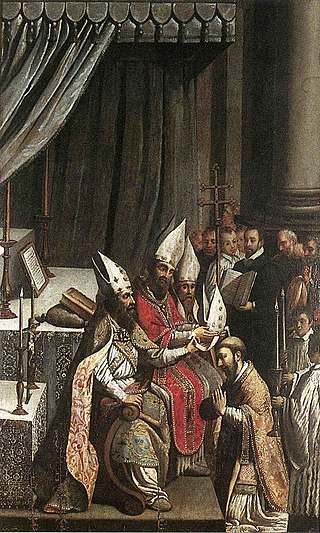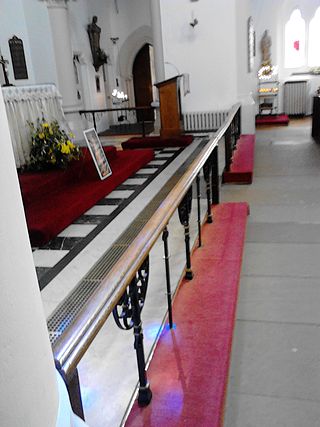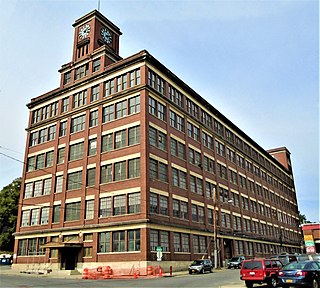
Apostolic succession is the method whereby the ministry of the Christian Church is considered by some Christian denominations to be derived from the apostles by a continuous succession, which has usually been associated with a claim that the succession is through a series of bishops. Those of the Catholic, Eastern Orthodox, Scandinavian Lutheran, Anglican, Oriental Orthodox, Church of the East, Hussite, Moravian and Old Catholic traditions maintain that "a bishop cannot have regular or valid orders unless he has been consecrated in this apostolic succession". These traditions do not always consider the episcopal consecrations of all of the other traditions as valid.
The Apostles' Creed, sometimes titled the Apostolic Creed or the Symbol of the Apostles, is a Christian creed or "symbol of faith".

An episcopal polity is a hierarchical form of church governance in which the chief local authorities are called bishops. The word "bishop" here is derived via the British Latin and Vulgar Latin term *ebiscopus/*biscopus, from the Ancient Greek ἐπίσκοπος epískopos meaning "overseer". It is the structure used by many of the major Christian Churches and denominations, such as the Catholic, Eastern Orthodox, Oriental Orthodox, Church of the East, Anglican, Lutheran and Methodist churches or denominations, and other churches founded independently from these lineages.
Saint Augustine or Augustine of Hippo (354–430) was a bishop, theologian and father of the Latin Catholic Church.
Full communion is a communion or relationship of full agreement among different Christian denominations or Christian individuals that share certain essential principles of Christian theology. Views vary among denominations on exactly what constitutes full communion, but typically when two or more denominations are in full communion it enables services and celebrations, such as the Eucharist, to be shared among congregants or clergy of any of them with the full approval of each.

Ecumenism – also called interdenominationalism, or ecumenicalism – is the concept and principle that Christians who belong to different Christian denominations should work together to develop closer relationships among their churches and promote Christian unity. The adjective ecumenical is thus applied to any non-denominational initiative that encourages greater cooperation and union among Christian denominations and churches.

The altar rail is a low barrier, sometimes ornate and usually made of stone, wood or metal in some combination, delimiting the chancel or the sanctuary and altar in a church, from the nave and other parts that contain the congregation. Often, a central gate or gap divides the line into two parts. Rails are a very common, but not universal, feature of Roman Catholic, Anglican, Lutheran, and Methodist churches. They are usually about two feet 6 inches high, with a padded step at the bottom, and designed so that the wider top of the rail can support the forearms or elbows of a kneeling person.
All Saints' Day is a Christian holiday.

Amsterdam is a city in Montgomery County, New York, United States. As of the 2020 census, the city had a population of 18,219. The city is named after Amsterdam in the Netherlands.
Catholic League may refer to:

Making the sign of the cross, or blessing oneself or crossing oneself, is a ritual blessing made by members of some branches of Christianity. This blessing is made by the tracing of an upright cross or Greek cross across the body with the right hand, often accompanied by spoken or mental recitation of the Trinitarian formula: "In the name of the Father, and of the Son, and of the Holy Spirit. Amen."
St. Peter's or similar terms may mean:
North Church or North Parish Church or variations may refer to:
St. James School and similar name forms may refer to:

Anglican interest in ecumenical dialogue can be traced back to the time of the Reformation and dialogues with both Orthodox and Lutheran churches in the sixteenth century. In the nineteenth century, with the rise of the Oxford Movement, there arose greater concern for reunion of the churches of "Catholic confession". This desire to work towards full communion with other denominations led to the development of the Chicago-Lambeth Quadrilateral, approved by the Third Lambeth Conference of 1888. The four points were stipulated as the basis for church unity, "a basis on which approach may be by God's blessing made towards Home Reunion":
Episcopal Church may refer to various churches in the Anglican, Methodist and Open Episcopal traditions.
St. Olaf's Church, or variants thereof, refers to churches dedicated to Olaf II of Norway, and may refer to:

Protestantism is a branch of Christianity that emphasizes justification by God through faith alone, the teaching that salvation comes by unmerited divine grace, the priesthood of all believers, and the Bible as the sole infallible source of authority for Christian faith and practice. The five solae summarize the basic theological beliefs of mainstream Protestantism.
This page is based on this
Wikipedia article Text is available under the
CC BY-SA 4.0 license; additional terms may apply.
Images, videos and audio are available under their respective licenses.







